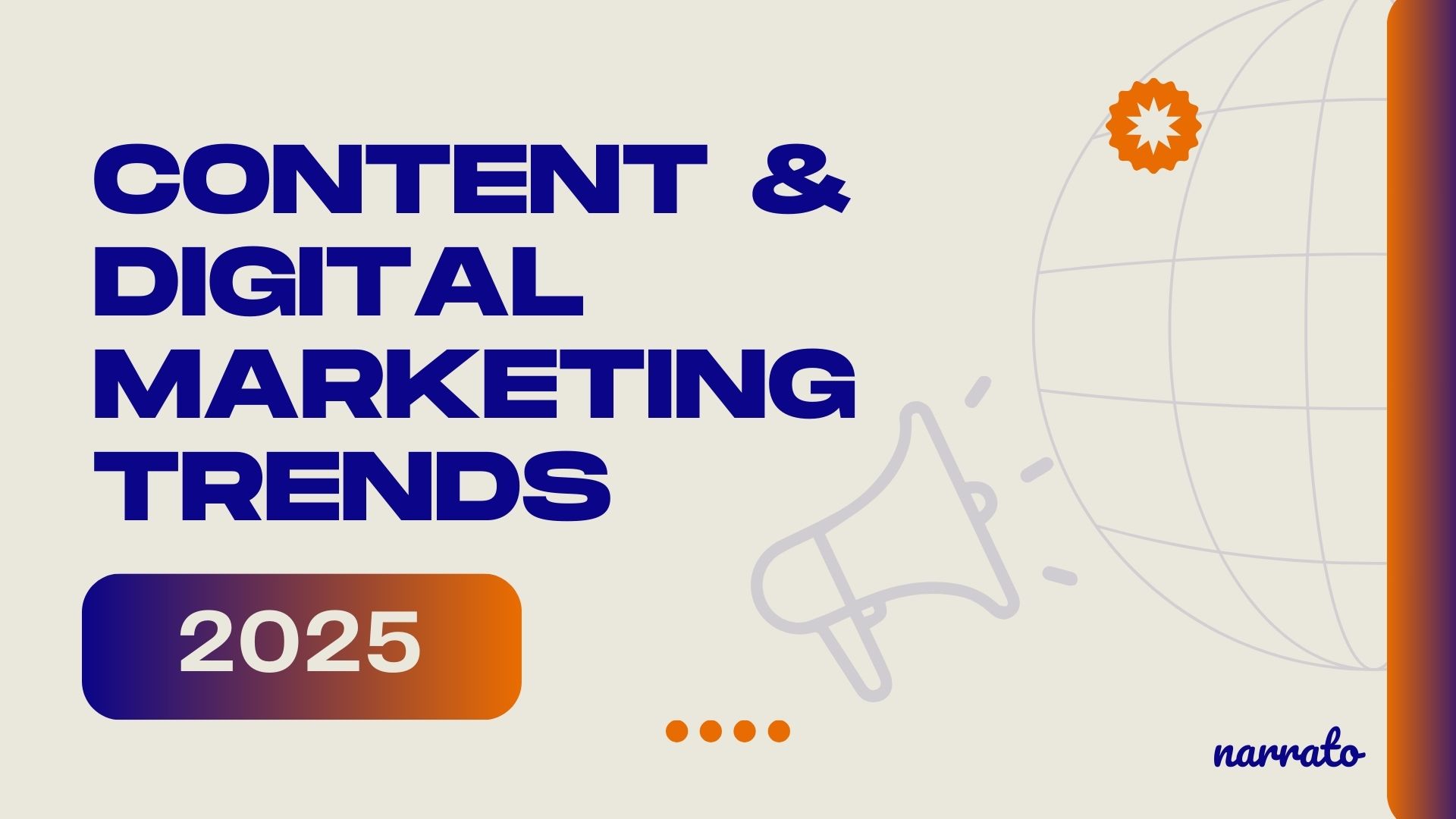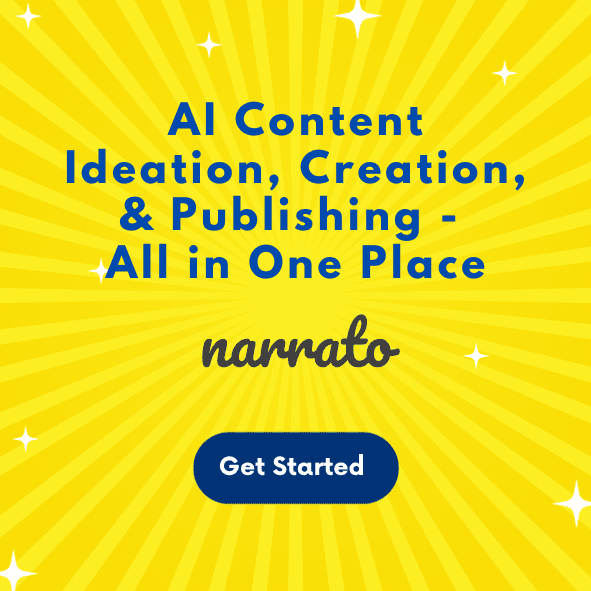As we gear up for 2025, the content and digital marketing landscape is undergoing rapid transformations, bringing both new challenges and opportunities. One of the most influential drivers of change in digital marketing trends is undoubtedly Artificial Intelligence (AI). AI-driven tools are quickly becoming essential for content creation, campaign analysis, and personalized consumer interactions. In fact, according to a 2024 Salesforce report, high-performing marketing teams are 2.5x more likely to have fully implemented AI in their operations compared to underperforming teams. But that’s not all. There’s so much more to keep up with in the world of marketing.
We, at Narrato, have always made it a point to bring you the most relevant and exciting content marketing trends each year. You loved our compilation of the top content marketing trends for 2024, and here we are again with the top content and digital marketing trends in 2025 that you should watch out for.
So without any more delay, here are the top 10 content and marketing trends for 2025.
1. AI-powered content creation and marketing workflows will take centerstage
2. Optimizing content for AI overviews in search will be crucial
3. AI-driven personalization to boost user experience
4. Immersive experiences in marketing will be in high demand
5. Omni-channel SEO and demand for always-on marketing strategies
6. AI content repurposing will see a significant boost in usage
7. Thought leadership content from founders and C-suite executives will be expected
8. Micro-conversions will become increasingly important
9. Privacy and ethical practices in marketing will matter more than ever
10. User-generated content will help in building trust and community

1. AI-powered content creation and marketing workflows will take centerstage
Generative AI is not only making waves, it’s practically setting a tsunami in motion in the marketing world! AI content marketing is constantly evolving. From being able to just rewrite text or translate content from one language to another, marketers can now do nearly anything with AI. Be it generating text-based content from images with AI image to text generator, getting weekly social media posts generated automatically by an AI content autopilot, or repurposing videos and podcasts into blogs and summaries with AI content repurposing tools. Imagine brainstorming campaigns, generating engaging ad copy, or analyzing campaign data in a matter of minutes — all of this is now a reality, thanks to AI. AI presentation tools are also transforming how marketers create and deliver content. With platforms like Decktopus, AI-driven tools can help you design professional presentations in no time, enhancing your marketing pitches and boosting engagement.
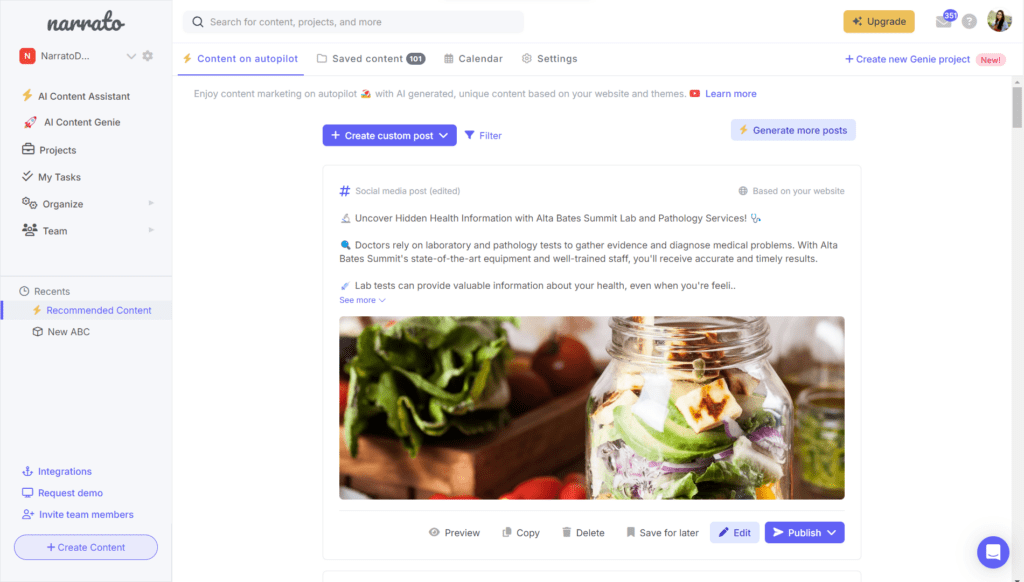
Narrato’s AI Content Genie – the content autopilot for social media and blog content
From all-in-one AI content creation and marketing platforms like Narrato to visual campaign generation platforms such as Typeface or image generators like DALL-E, AI is making content creation more accessible than ever. AI is here to take on the heavy lifting, allowing digital marketers to focus more on strategy and creativity.
And let’s not overlook the analytics game-changer that AI brings to the table. Predictive analytics and AI-driven planning and forecasting are reshaping how marketers understand consumer behavior, enabling more personalized marketing campaigns. A survey conducted by Smart Insights and Technology of Marketing shows that a good chunk of marketers are using AI for marketing analytics and planning strategy, though the major use cases are still in generating content.

As AI continues to expand its capabilities, we can expect even more revolutionary features, such as automated A/B testing and AI-driven influencer marketing.

2. Optimizing content for AI overviews in search will be crucial
AI technology isn’t just transforming how content is created, but also how it’s presented and discovered online. As AI algorithms get smarter, optimizing your content specifically for AI-driven search models will become crucial by 2025. Google is already serving up AI overviews to its users, where you get AI-generated summaries of your search queries and these show up even before the top search results. The summaries also include some links to the top pages in the search results that the AI generated the summary from.
In some cases, these AI overviews may even answer complex questions like “What are the steps involved in making an authentic Baked Alaska?” or “What is the most perfect 5-day itinerary for a trip to Greece?”.

Search engines leveraging AI, like Google’s continuous evolution in using AI algorithms, mean that content must meet higher standards of expertise, authoritativeness, and trustworthiness—often referred to as the EEAT criteria. It’s not just about keywords and backlinks anymore, it’s about feeding the AI exactly what it needs to elevate your content visibility.
To make the most of this trend, content needs to be comprehensive yet concise, with a keen focus on user experience. This means structuring content to directly answer user queries and weaving in conversational search terms that sync well with voice search and AI interpretations. Your content strategy in 2025 should embrace both traditional SEO practices and these advanced AI inclusivity techniques to ensure your place at the top of search result pages. Marketers who stay updated with digital marketing insights will find it easier to adapt their strategies for both traditional SEO practices and advanced AI inclusivity techniques to ensure their place at the top of search result pages.
By 2025, and beyond, those who optimize their content with AI in mind will stand out from the competition and enjoy higher rankings, broader reach, and ultimately, more significant engagement with their target audience. This digital marketing trend is here to stay and it will only keep challenging marketers a little more every year.
3. AI-driven personalization to boost user experience
As we cruise through the top content marketing trends for 2025, AI-driven personalization is stepping into the spotlight changing how brands interact with their audiences. Think of it like your digital best friend, always ready to offer you exactly what you need before you even know you need it! We’ve seen companies like Netflix and Spotify leading the charge with their seamless, intuitive recommendations. Spotify’s end-of-year playlists make it feel as though the app knows your musical soul, while Netflix’s recommendations are so spot-on that most users would happily rely on them for their next binge-watch.
This innovation doesn’t stop there. Imagine AI-generated review summaries that could simplify hours of research into simple, digestible insights. Amazon is already doing something on those lines, though these aren’t personalized summaries yet.

Consumers crave these personal touches because it makes them feel valued and understood. And it’s a win-win because businesses see higher engagement and conversions. Brands can tailor every interaction to reflect individual preferences, offering browsing and personalized shopping experiences with AI for eCommerce, that feel like a joyride.
Of course, personalization also means you will need a lot of user data. And with handling user data comes privacy concerns. So while AI personalization is the need of the hour, you’ll also have to ensure strict privacy policies and ethical data collection and storage practices. AI tools are still at a relatively nascent stage when it comes to handling data, so utmost care has to be taken on training and compliance to established privacy policies like GDPR . Plus, using a VPN for Opera ensures a more secure online experience, helping to safeguard personal data while navigating personalized eCommerce sites.
4. Immersive experiences in marketing will be in high demand
It’s 2025 and marketing is no longer just about catching your audience’s attention; it’s about pulling them into a whole new world! Companies are increasingly using Augmented Reality (AR) and Virtual Reality (VR) to create compelling, interactive marketing experiences. Imagine trying on clothes virtually or exploring a hotel room in a VR tour before booking your dream vacation. If you can dream it, immersive tech can probably achieve it.
Brands like IKEA have already tapped into AR, allowing consumers to visualize furniture in their homes before making a purchase, and it has been a while.

IKEA Place app. Source: IKEA
This technology will continue to grow as businesses seek novel ways to provide rich, interactive experiences that captivate their audiences’ imaginations. By offering immersive experiences, brands aren’t just selling products, but crafting memorable stories that resonate on a personal level. And who doesn’t want to be part of a great story?
AI personalization and immersive experiences are digital marketing trends that are set to become the backbone of successful marketing strategies, setting the stage for a new era of consumer engagement. So, strap in and get ready for a marketing journey that’s equally exciting for both you and your customers!
5. Omni-channel SEO and demand for always-on marketing strategies
Omni-channel SEO and always-on marketing strategies will be expected of most businesses in the year ahead. But what does that mean, really? Well, imagine a world where your brand is seamlessly present across all digital touchpoints, providing a consistent, frictionless experience whether your audience is browsing social media, watching videos, or reading blog posts.
Omni-channel SEO is all about maintaining brand visibility and coherence across multiple platforms, be it through voice, text, or video content. This strategy ensures that wherever your audience turns, they find you—like a friendly guide throughout their customer journey. As more consumers expect seamless experiences, digital marketers have to integrate SEO tactics across every channel. Agencies like Web Tonic are helping brands execute these complex strategies with precision, ensuring optimal visibility and engagement across the digital spectrum.
But why the buzz about always-on strategies? Simply put, customers want instant interactions and quick answers. They expect brands to be responsive 24/7, ready to engage, inform, and entertain with timely and relevant content. With tools like AI bots and predictive analytics, marketers can automate and streamline customer interactions, allowing them to respond swiftly to such consumer demands. This may have been one of the much talked about content marketing trends of 2023 and ’24 too, and it continues to grow in importance,
Brands that embrace this level of connectivity and responsiveness are those that will thrive. By adopting an always-on approach, you not only maintain a constant presence but also nurture stronger relationships with your audience.
6. AI content repurposing will see a significant boost in usage
One area where AI is making a remarkable impact is content repurposing. AI content repurposing tools can take a great blog post and transform it into an engaging newsletter or repurpose video and audio with AI into summaries, social media posts, or anything else — all without missing the core message.
AI-driven content repurposing offers digital marketers the ability to maximize their resources. It efficiently transforms existing content into various formats, making it easy to reach different segments of the target audience on various platforms. For example, a single piece of content can be tailored to suit social media feeds, email newsletters, and video platforms, ensuring a wider reach without the need for constant content creation.
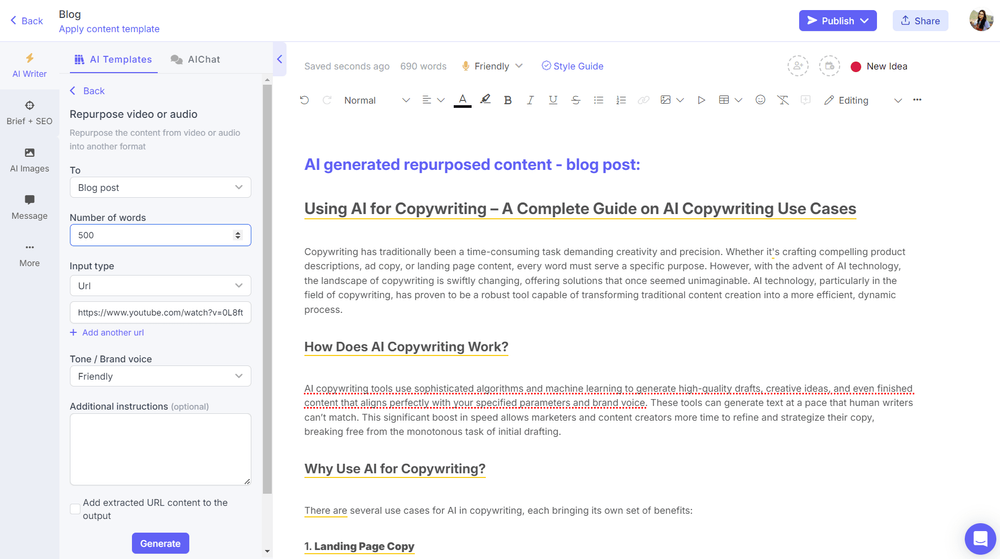
Narrato’s AI Content Repurposing Tool
This AI content marketing trend is not only about convenience — it’s about strategy. Repurposing content using AI helps maintain consistency in messaging while adapting to new marketing channels quickly. Integrating tools like The QR code generator can extend this strategy offline, enabling brands to link printed materials to updated digital assets, ensuring cohesive messaging across touchpoints. This adaptability is crucial in a world where digital marketing trends shift rapidly and consumer preferences evolve even faster. For marketers aiming to efficiently manage and organize all their content, consulting a DAM system buyers guide can provide valuable insights and help choose the right digital asset management solution.
This AI content marketing trend is not only about convenience — it’s about strategy. Repurposing content using AI helps maintain consistency in messaging while adapting to new marketing channels quickly. Integrating tools like The QR code generator can extend this strategy offline, enabling brands to link printed materials to updated digital assets, ensuring cohesive messaging across touchpoints. This adaptability is crucial in a world where digital marketing trends shift rapidly and consumer preferences evolve even faster.
With AI, you will be equipped to deliver the right message, in the right format, at the right time, making 2025 a year where your content will truly come to life across platforms, captivating audience attention like never before.

7. Thought leadership content from founders and C-suite executives will be expected
Showcasing expertise and authority in your industry has never been more crucial, especially when it comes to B2B marketing. By 2025, there’s an increasing expectation for founders and C-suite executives to step up as thought leaders. This shift is not just about sharing a company logo or a successful track record – it’s about providing valuable insights and knowledge to build trust.
Why is this important? Well, consumers today are savvier and crave authenticity. They want to know the minds behind the brands they support. By positioning themselves as thought leaders, executives can demonstrate their expertise, authoritativeness, and trustworthiness— concepts widely recognized in SEO as E-A-T (Expertise, Authoritativeness, Trustworthiness).
Here are a few steps that executives can take to build their thought leadership:
- Take a customer-centric approach: Ensure that your leadership message aims at benefiting the customer directly.
- Build a long-term strategy: Thought leadership isn’t about quick wins. It’s a long-term commitment to sharing insights and building a reputation.
- Integrate across channels: Incorporate thought leadership into various facets of your business strategy—from product design to marketing tactics.
- Create original content that adds value: Share useful advice, industry insights, and personal experiences on platforms like LinkedIn, company blogs, and webinars.
8. Micro-conversions will become increasingly important
As digital marketing becomes more precise and data-driven, micro-conversions are gaining ground as essential metrics in 2025. While macro-conversions like sales are critical, micro-conversions are the smaller steps users take that indicate heightened engagement and movement through the sales funnel.
Why focus on micro-conversions? They provide valuable insights into customer behavior and can highlight potential areas for improvement in the user journey. Tracking micro-conversions involves paying attention to actions such as:
- Newsletter sign-ups
- Social media interactions, such as comments, shares, and follows
- Filling out a contact form
- Downloading a whitepaper or e-book, and other such actions.
Mastering these touchpoints has become a defining trait of what it takes to be considered an agency of the year by Forbes, where sustained engagement and customer insight lead the strategy.
By prioritizing these actions, you as a marketer can enhance personalization strategies and refine content to meet the needs of your target audience. This approach not only helps in improving the customer experience but also in nurturing leads more effectively.
Understanding and optimizing for micro-conversions enables digital marketers to create more cohesive, customer-focused strategies in 2025, ultimately leading to better engagement and higher conversion rates.
9. Privacy and ethical practices in marketing will matter more than ever
In this digital-first era today, privacy and ethical practices are not just a preference—they are paramount. Consumers are increasingly concerned about how their data is being used. According to certain research reports, nearly three-quarters of Americans are “very concerned” or “extremely concerned” about their online privacy. This heightened awareness is prompting businesses to revisit their data collection and usage strategies.
The gradual phase-out of third-party cookies by giants like Google and Apple has accelerated this trend. Companies now need to pivot towards first-party data collection, which involves gathering information directly from consumers with their consent. o further strengthen security in this transition, many organizations adopt a Linux VPN to ensure encrypted data exchanges and safeguard customer information. Doing so not only complies with stringent privacy regulations but also builds trust by being transparent about data usage.
Marketers must focus on creating a relationship where customers feel secure and respected. This approach not only keeps your business in compliance with privacy laws but also enhances brand loyalty. The brands that succeed in 2025 will be those that prioritize ethical practices and demonstrate a commitment to protecting consumer privacy.
10. User-generated content will help in building trust and community
User-generated content (UGC) has been one of our favorite digital marketing trends over the years, and it is rapidly becoming the cornerstone of building trust and fostering community in the digital space. As brands aim for authenticity, the value of content created by real people is undeniable. A recent study by Entribe revealed that 86% of consumers are more likely to trust a brand that publishes user-generated content. Contrary to influencer marketing, buyers find actual, honest user-generated content more reliable.
UGC allows brands to create a sense of community and inclusivity, turning consumers into brand advocates. For instance, campaigns like the clothing band Aerie’s #aeriereal empower customers to share unfiltered images, which not only drives engagement but also enhances the brand’s credibility and relatability.
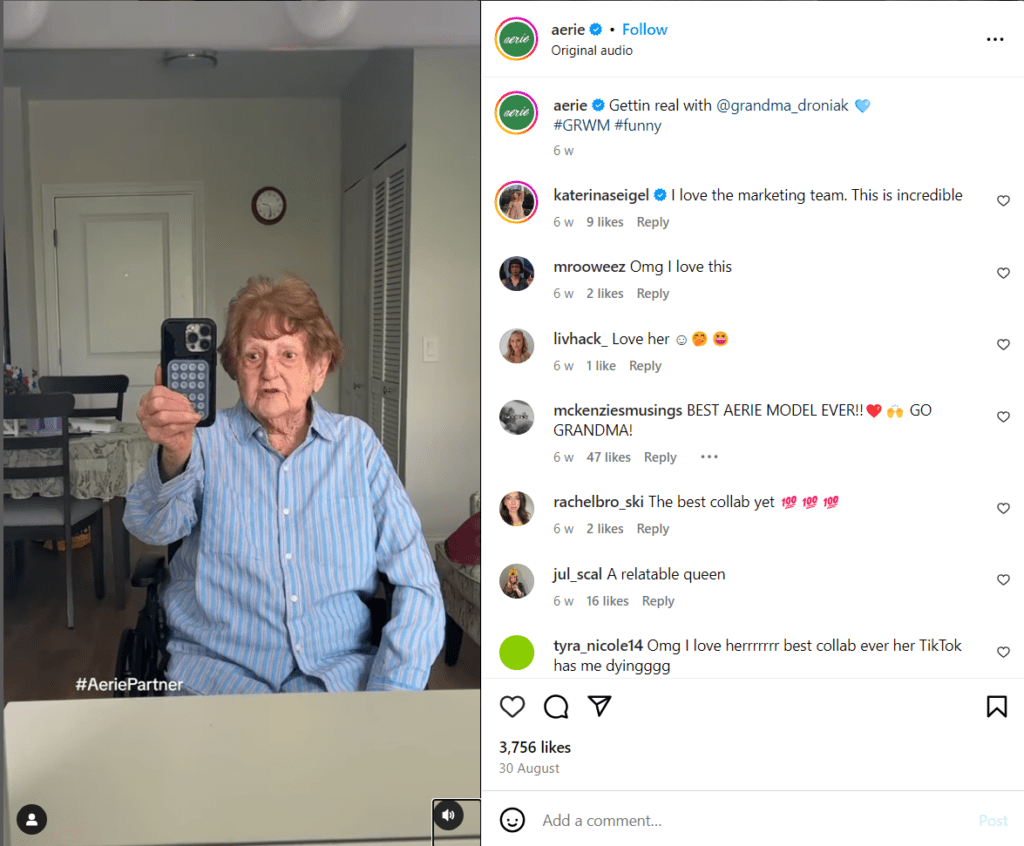
Source: Aerie on Instagram
By leveraging UGC, businesses tap into their audience’s creativity and passion, generating content that resonates more powerfully than traditional marketing efforts. In 2025, brands that strategically utilize UGC will likely see heightened consumer engagement and a more robust sense of community, ultimately translating into increased brand loyalty and market success.
Wrapping up
As we gaze into the future of 2025, the landscape of digital marketing is nothing short of extraordinary. From the innovative use of AI content marketing tactics in crafting personalized and predictive marketing strategies to relatable user-generated content, marketers are presented with countless digital marketing trends to engage audiences more effectively. The spotlight on data privacy is reshaping how marketers gather and utilize data, placing an even greater emphasis on first-party data.
Additionally, content marketing trends that point toward personalized content continue to gain traction, with consumers increasingly valuing authenticity and relevance in their interactions. Platforms such as YouTube and emerging channels like the metaverse are providing fresh venues for younger demographics and tech-savvy audiences hungry for innovative digital experiences.
The future of content and digital marketing in 2025 is both exciting and challenging, urging brands to be more innovative, transparent, and consumer-centric than ever before. By staying ahead of these trends, you can not only navigate the complexities of the digital marketing world effortlessly but leverage them to foster growth and forge stronger connections with your audiences. Let’s make this our year!


